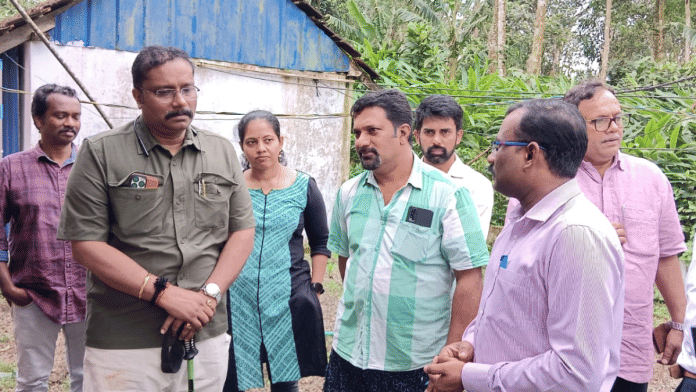Thiruvananthapuram: “An officer should only be worried if career has been a smooth sail through the backwaters,” B.Ashok said, shrugging off his latest faceoff with the Left Democratic Front (LDF) government in Kerala.
The 1998-batch Indian Administrative Service (IAS) officer is at the centre of his run-in with the Left Democratic Front (LDF) government after he was transferred from the agriculture department to the post of chairperson and managing director of Kerala Transport Development Finance Corporation (KTDFC).
For the veterinary scientist-turned-bureaucrat, legal battles and disciplinary actions are not new as he has run-ins with successive Kerala governments, be it the LDF or the United Democratic Front (UDF).
In fact, it is the second transfer for Ashok in 2025 itself. At the start of the year, he was moved to the Local Self-Government Reforms Commission, a posting that he challenged before the Central Administrative Tribunal (CAT). The tribunal ruled in his favour, noting that deputation of IAS officers requires the Union government’s approval as well as the officer’s consent.
On Tuesday, the tribunal again stayed the Kerala government order to appoint the Kerala cadre officer as the KTDFC chairperson.
The latest transfer seemingly came after Ashok submitted a report regarding the leak of an inquiry he carried out on the diversion of World Bank funds meant for the Kerala Climate Resilient Agri–Value Chain Modernisation (KERA) project. Ashok’s report had suggested the leak happened from the Chief Minister’s Office.
“It is in evident abuse of power to depute an officer under the IAS cadre rules and against the articles of the KTDFC. So it shall, in my belief, be successfully challenged. It is not sustainable,” Ashok had told ThePrint before the CAT stayed the Pinarayi Vijayan government’s order.
“It’s hard for politicians to support individuals and offices because of political pressure,” he said, elaborating on his frequent tussle with the administration.
His record of run-ins divides the opinion surrounding him among the civil service community. Ashok is an “intelligent” officer but not always a “team player,” which leads to controversies, according to a retired civil servant.
“He is an intelligent officer, who can deliver. There is no doubt about that. But we all work in hierarchy and we have to work as a team. We are not sure if he is a team player,” the retired civil servant told ThePrint.
Critic of ‘Kerala model’
Ashok holds a Bachelor’s degree in veterinary science, after which he attended the University of London and Duke University for higher studies in Water Science, Policy & Management following his early posting as the Project Director of Jalanidhi, the rural water supply initiative in Kerala.
He has also worked as the district collector of Pathanamthitta and chairperson of the Marine Products Export Development Authority under the Ministry of Commerce and Industry, prior to assuming the role as the founding vice-chancellor of the Kerala Veterinary and Animal Sciences University (KVASU).
His team, according to the IAS officer, was able to lay a strong foundation for the University with about Rs 400 crore of academic infrastructural investment as well as collaborations with Western universities.
“Due to our intense hard work, the University steadily climbed in its academic position and got the Chancellor’s Award for the young university in 2016, barely months after my term ended,” he said.
In April, he won the Best ‘Policy Paper’ award at the 16th Round of the Mid-Career Training Programme Phase-V at the Lal Bahadur Shastri National Academy of Administration for the paper focusing on India’s agricultural processing sector titled, ‘Harnessing India’s Agri-Processing & Value Addition Sector.’
Hailing from Kollam district, one of the first standoffs in Ashok’s career happened during the UDF government headed by the late Oommen Chandy in 2011. This was after he wrote an article criticising senior IAS officers holding several posts on a charge basis. He was removed from the post of KVASU vice-chancellor immediately. In July 2021, the Kerala High Court ruled in his favour and recalled the order.
While his clashes with the UDF were beginning, the 52-year-old officer saw more controversies under the Left administration.
In 2022, Ashok was removed as the Kerala State Electricity Board (KSEB) chairperson following clashes with employee unions. He had also reportedly posted critical remarks about the efficiency of the KSEB administration on Facebook, which were later deleted.
The same year, as agriculture secretary, he publicly criticised a draft Bill proposed by the government to remove the Governor as Chancellor of universities, questioning the lack of reasons provided in the Bill.
The criticism came amid the government’s continuous tussle with the Raj Bhavan as the Governor was refusing to approve the vice-chancellor recommendations made by the state.
Friction happens irrespective of the political parties, as cadre-based parties are often ‘rigid’ in their approach to policy making and taking advice from civil servants, the IAS officer said. “The UDF ministers tend to be slightly more diplomatic. LDF has had excellent ministers too, but they often do their thinking more within party circles than with government servants,” he added.
Ashok has been a vocal critic of the ‘Kerala model’ of development, a policy widely publicised by Kerala’s communist leaders regarding socially inclusive and progressive policies that focus on social indicators.
“In a sense, both fronts are slightly left of centre in policies. Kerala really needs a slightly right-of-centre pro-investment, growth and jobs party or front to challenge the familiar status quo,” the civil servant said.
ThePrint reached spokespersons of the Communist Party of India (Marxist), or the CPI(M), and the Congress, but both of them declined to comment.
(Edited by Tony Rai)
Also Read: ‘Absent’, ‘rude’—a year on, Suresh Gopi’s star win fades in Thrissur amid voter trust deficit






